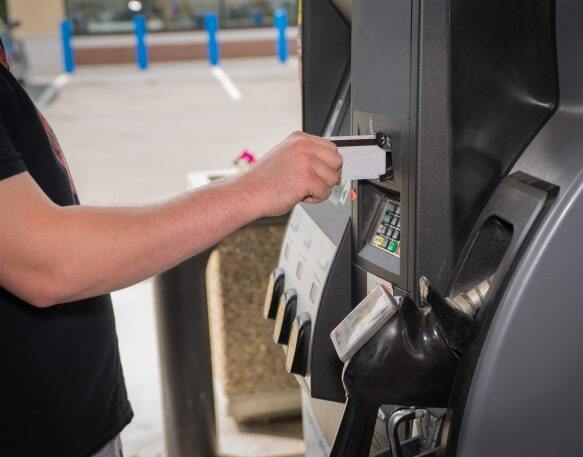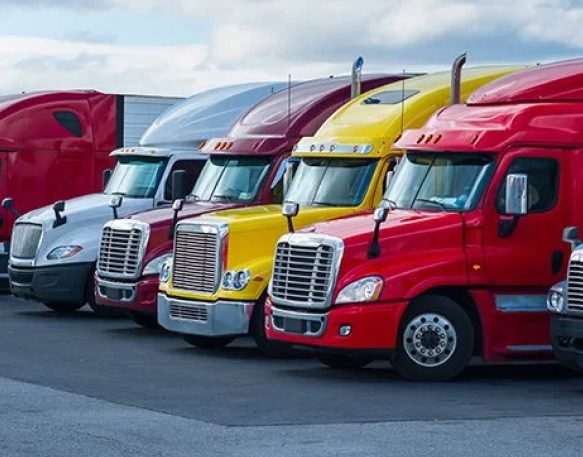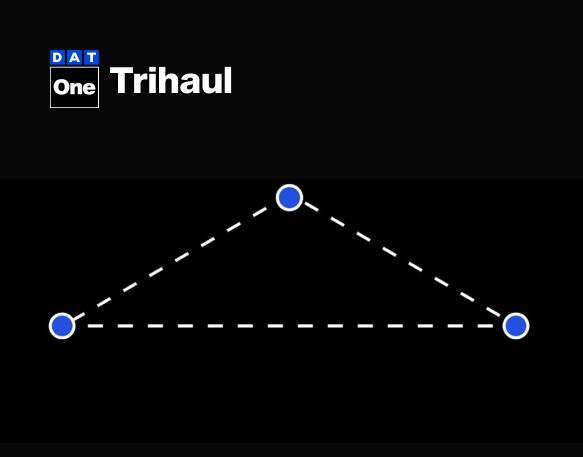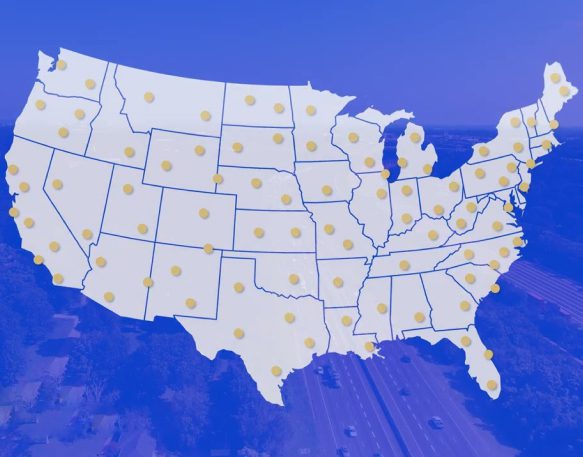As a carrier, you know just how important expensive fuel is, especially if you’re in charge of a sizable fleet. There’s a reason fuel is the biggest operating cost for carriers. It’s pricey and unpredictable, meaning you need to do everything in your power to manage your fuel costs. This is where fleet fuel cards can come in to make life easier.
Fleet fuel cards were designed to streamline and optimize fuel purchasing and can make a world of difference for carriers. Not only will they give you access to discounted rates at a network of fueling stations, but they will also often allow you to gain insights into and control over truckers’ spending. However, not all fuel cards are created equal.
Understanding fleet fuel card options
There are several types of fleet fuel cards available. You can use:
- Branded fleet fuel cards: Branded fuel cards provide higher-than-average rebates but will only work at that specific brand’s gas station. For example, if you have an Exxon fuel card, you’ll only save at the pump when purchasing gas from an Exxon station. It’s also worth noting that the amount of gallons you purchase each month can influence your rebate, meaning carriers with smaller fleets may not see the same savings as those with larger fleets.
- WEX and Fuelman fleet fuel cards: WEX and Fuelman specialize in fleet fuel cards and negotiate discounted pricing with gas stations around the country. If you have a WEX or Fuelman fleet card, you’ll be able to access rebates at thousands of stations.
- Fleet fuel cards running on major credit card issuers’ networks: You can also use a fleet card that runs on a major credit card issuer’s network. For example, the Coast and AtoB cards run on Visa’s network and don’t come with the same restrictions as some of the other fuel cards. You’ll be able to use these cards everywhere Visa is accepted and can earn a 2-3-cent rebate per gallon or more.
Generally, regardless of which fuel card you choose, you’ll only be able to use it within a specific network of stations, so choose wisely!
Strategies for maximizing fuel efficiency
Cutting costs at the pump is only one part of the puzzle. You’ll also want to try to maximize fuel efficiency while on the road, as this can help you save money while reducing your environmental impact.
First, concentrate on optimizing your routes. Chances are, there are more efficient ways to reach your destinations that can help reduce fuel consumption and minimize travel time. Don’t be afraid to use route planning software or GPS systems to identify the most fuel-efficient routes based on traffic patterns, road conditions, elevation changes, and distance. By avoiding congested routes and unnecessary detours, you can save both time and fuel.
Additionally, make sure to stay on top of your vehicle maintenance. By performing regular maintenance checks, tire rotations, air filter replacements, engine tune-ups, and more, you can help your fleet’s vehicles operate at peak efficiency, lowering fuel consumption.
Depending on the state of your vehicles, you may also want to invest in fuel-efficient vehicles or upgrade your fleet. While investing in things like fuel-efficient engines, aerodynamic designs, and idle reduction systems will require you to spend some money upfront, it can introduce significant long-term fuel savings.
It’s also worth providing drivers with training that will help them improve their fuel efficiency. For example, give drivers a refresher course on fuel-efficient driving techniques, including how to accelerate smoothly, maintain a steady speed, and brake on time. Additionally, teach them to avoid driving behaviors that increase fuel consumption, such as speeding and excessive idling.
Leveraging technology for efficiency
You can also turn to technology to streamline operations for improved efficiency. Consider adopting:
- Telematics systems: Telematics systems rely on GPS technology and onboard sensors to collect data on things like vehicle speed, location, and fuel consumption. With the help of telematics systems, you can analyze driver behaviors to identify and resolve fuel inefficiencies. Telematics systems can help you detect excessive idling, aggressive driving, speeding, and more, helping you provide helpful feedback to your drivers. Telematics systems can also help you optimize your routes, diagnose vehicle problems, and take a proactive approach to maintenance scheduling.
- Fleet fuel card management platforms: Fuel card management platforms can also help you better manage fuel costs, as they’ll give you control and visibility over your fleet’s fuel expenses. You can easily track your drivers’ fuel purchases, review fuel consumption, and analyze drivers’ spending patterns from a central location in real-time. Plus, you can integrate your fuel card management platform with other systems to gain an even more comprehensive overview of your fuel usage and take more efficient actions to improve fuel usage.
- Vehicle tracking software: Vehicle tracking software can help you track your fleet in real-time, allowing you to redirect vehicles, reallocate resources, prevent unauthorized vehicle use, and respond to emergencies faster.
- Mobile applications: It seems like everything is becoming increasingly mobile—and the trucking industry is no exception. With mobile applications on your side, you can ensure your drivers have access to the information and tools they need while they’re on the road. For example, your drivers can receive updates on routes, traffic conditions, and fuel prices in real-time, enabling them to make more informed choices to help you cut costs.
Negotiating with fuel suppliers and providers
Saving with the help of a fleet fuel card is great, but it’s not the only way you can cut costs. You should also try negotiating with fuel suppliers and providers.
Begin with some thorough research. Look into current fuel market trends. View your current supplier’s offerings as well as their competitor’s rates—and don’t forget to look at your fleet. Take the time to understand your fuel consumption patterns and carefully assess your current and future needs.
If you don’t already have a strong relationship with your fuel supplier, you need to work on building one! After all, a strong sense of trust and a good rapport can go a long way when it comes to negotiating, as companies often give more favorable pricing and contract terms to the carriers they like working with. You might consider bringing up:
- Volume-based discounts: If you regularly purchase large amounts of fuel, it may be possible to negotiate a volume-based discount with fuel suppliers. You may have to commit to purchasing a certain amount of fuel upfront, but if you were already going to buy fuel from your supplier anyway using your fleet fuel cards, this could mean lower per-gallon rates.
- A flexible pricing structure: You can also try negotiating flexible pricing structures based on your needs and budget. Depending on your situation, you might consider fixed pricing, index-based pricing, or discounts that change based on market fluctuations.
After receiving your contract, review and negotiate its terms and conditions. Don’t forget to compare prices to other suppliers to ensure you’re getting the best possible rates.
Compliance and security considerations
Using fleet fuel cards introduces additional regulatory compliance and security considerations. You’ll want to:
- Ensure your fleet fuel card program meets regulatory requirements: It’s important to comply with any regulations, including those surrounding fuel tax reporting, payment card industry standards, and data privacy at the federal, state, and local levels.
- Employ user authentication techniques: Cards can get stolen, so it’s a good idea to have user authentication systems in place. Consider using PINs, passwords, or biometric authentication methods to help prevent unauthorized individuals from using your fuel cards or accessing sensitive account information.
- Monitor transactions: It’s easy to assume that everything is as it should be, but it’s important not to get too complacent. Monitor fuel card transactions in real-time to detect and address security threats and mitigate risks.
- Create an incident response plan: Accidents happen, and it’s always better to be over-prepared than under-prepared. So, develop an incident response plan outlining what you’ll do if something goes wrong with a fleet fuel card.
- Train employees: You should also make sure that your drivers know all about security best practices and proper fuel card usage.
The DAT One Fuel Card
The DAT One™ Fuel Card, powered by OTR Solutions, is an excellent option for fleet managers looking for convenience, expense management tools, and top-of-the-line savings all rolled into one. The DAT One Fuel Card is one of the best fleet fuel cards out there. Its users save an average of $0.50 per gallon and can save up to $1.73 per gallon at in-network locations. This can add up over time, especially if you have a sizable fleet. You can easily save over $500 in fuel costs each month per truck.
While other fuel cards have large transaction fees that can quickly eat into any money you might save with them, the DAT One Fuel Card doesn’t have any transaction fees at over 2,200 in-network locations. You’ll be able to fuel up at TA Petro, Speedway, AMBEST, and more without worrying about transaction fees.
And if your credit score isn’t perfect, don’t worry! The DAT One Fuel Card is a prepaid card, which means you can start saving without hopping through credit check hoops. In fact, getting signed up takes as little as three minutes!
What’s more, you’ll never be alone. The in-house OTR Solutions support team will be there every step of the way to help you make the most of your fuel card. You can also take advantage of Fuel Finder, a free tool designed to help you optimize discounts and maximize margins on every trip, and instantly add funds through the OTR Solutions mobile app.
Save money with the DAT One Fuel Card
When it comes to fleet fuel cards, you can’t do better than the DAT One Fuel Card. With its industry-leading savings, wide usage network, useful expense management tools, and lack of transaction fees, the DAT One Fuel Card is an incredibly powerful tool for carriers looking to save at the pump – and beyond!
Maximize Your Savings With The DAT One Fuel Card!
The DAT One Fuel Card can be a game-changer for carriers. You’ll be able to save money at thousands of locations across the country and can say goodbye to transaction fees at in-network locations. Sign up today to start seeing savings!




